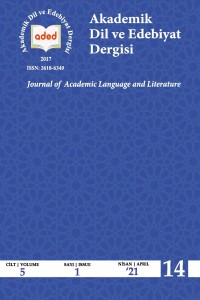Abstract
Social identity is a structure that is rebuilt every day during and through the use of language. The choices made while using the language reflect the speaker's assumptions, intentions and perceptions. Besides, behaviour patterns related to language use are social tools that help orient the communication and shape the feelings and thoughts of the addressee and consequently his/her behaviours as well. These aspects of language use are the cause why the speaker tries to protect his own identity as well as the identity of the addressee or of the ‘other’ which may be, or may not be physically present. One of the reasons for this effort is to avoid exposure to unwanted linguistic behaviour, thus to protect the face. An individual makes this effort in the context of politeness, mostly in a dialogue. Being polite / Politeness is a social behaviour strategy that makes it easy for individuals to establish healthy and sustainable communication. Politeness is manifested through the use of language, shapes dialogue and preserves social identity; and it is a study field of pragmatics. Up to date there have been two main approaches in ‘politeness theory studies’. The first approach is based on the principles that are followed/must be followed in communication and is refined/represented through the work(s) of Grice, Leech and Lakoff. The second one is based on the concept of "face".
The present study is based on the framework of Leech's Politeness Principles Theory and aims to bring out the politeness strategy of the protagonist of Suat'ın Mektubu, a literary text, according to the politeness theory, which in Turkey still remains an under-researched subject.
References
- Brown, Penelope; Levinson, Stephen Curtis (1978). "Universals in Language Usage: Politeness Phenomena". In E. Goody (Ed.). Questions and Politeness: Strategies in Social Interaction. Cambridge: Cambridge University Press. 56-310
- Brown, Penelope; Levinson, Stephen Curtis (1987). Politeness: some universals in language usage. Cambridge: Cambridge University Press.
- Demirezen, Mehmet (1991). "Pragmatics and Language Teaching", Hacettepe Üniversitesi Eğitim Fakültesi Dergisi C: 6 S: 6: 281-287.
- Dervişcemaloğlu, Bahar. "Pragmatik ve Söz Edimleri". http://www.ege-edebiyat.org/docs/Pragmatik.doc [erişim tarihi: 15 Kasım 2020]
- Grice, Herbert Paul (1975). "Logic and Conversation". Syntax and Semantics 3: Speech Acts. In P. Cole et al. (eds.). 41-58.
- Işık Güler, Hale (2008). Metapragmatics of (Im)politeness In Turkish: An Exploratory Emic Investigation, Yayınlanmamış Ankara: Ortadoğu Teknik Üniversitesi.
- Lakoff, Robin Tolmach (1973). "The Logic of Politeness: or, Minding Your p's and q's", Papers from the 9th Regional Meeting of the Chicago Linguistic Society, Ed. C. Corum, T. Cedric Smith-Stark, & A. Weiser. Chicago: Linguistic Society. 292-305.
- Leech, Geoffrey Neil (1983). Principles of Pragmatics. Longman Linguistics Library No: 30, New York: Longman.
- McAdams, Dan P. (1993). The stories we live by; Personal myths and the making of the self. New York: William Morrow.
- Morris, Charles William (1938). "Foundations of the Theory of Signs". International Encyclopedia of Unified Science, Vol. I, No.2. In Otto Neurath et al. (eds.), Chicago, Illinois: The University of Chicago Press. 1-59.
- Tanpınar, Ahmet Hamdi (2019). Suat'ın Mektubu, haz. Handan İnci vd., İstanbul: Dergah Yayınları.
Abstract
Sosyal kimlik dil kullanımları esnasında ve onun aracılığıyla her gün yeniden inşa edilen bir yapıdır. Dili kullanırken yapılan tercihler konuşanın varsayımlarını, niyetini ve algılarını yansıtır. Bunun yanı sıra dil kullanımıyla ilişkili davranış şekilleri; iletişimde yön vermeye, muhatabın duygu ve düşüncelerini dolayısıyla davranışlarını şekillendirmeye yarayan önemli bir sosyal araçtır. Bu yönleri dili kullanan kişinin; kendisinin, muhatabının ve orada fiziki olarak bulunan yahut bulunmayan ötekinin kimliğini korumak veya idare etmek için çaba göstermesine neden olur. Bu çabanın sebeplerinden bir tanesi istenmedik dilsel davranışlara maruz kalmaktan kaçınmak, yüzü korumaktadır. Kişi, bu çabayı en çok diyalog esnasında nezaket bağlamında sarf eder. Nezaket bireylerin sağlıklı ve sürdürülebilir bir iletişim kurmasını kolaylaştıran sosyal bir davranış stratejisidir. Dil kullanımıyla ortaya çıkan, konuşmayı şekillendiren ve sosyal kimliği koruyan nezaket, edimbilimin bir inceleme alanıdır. Nezaket araştırmaları günümüze dek iki temel yaklaşım üzerinden ilerlemiştir. Bunlardan ilki Grice, Leech ve Lakoff'un öne sürücüleri/geliştiricileri olduğu iletişimde uyulan/uyulması gereken ilkeler temelli anlayış, diğeri "yüz" kavramına dayalı anlayıştır.
References
- Brown, Penelope; Levinson, Stephen Curtis (1978). "Universals in Language Usage: Politeness Phenomena". In E. Goody (Ed.). Questions and Politeness: Strategies in Social Interaction. Cambridge: Cambridge University Press. 56-310
- Brown, Penelope; Levinson, Stephen Curtis (1987). Politeness: some universals in language usage. Cambridge: Cambridge University Press.
- Demirezen, Mehmet (1991). "Pragmatics and Language Teaching", Hacettepe Üniversitesi Eğitim Fakültesi Dergisi C: 6 S: 6: 281-287.
- Dervişcemaloğlu, Bahar. "Pragmatik ve Söz Edimleri". http://www.ege-edebiyat.org/docs/Pragmatik.doc [erişim tarihi: 15 Kasım 2020]
- Grice, Herbert Paul (1975). "Logic and Conversation". Syntax and Semantics 3: Speech Acts. In P. Cole et al. (eds.). 41-58.
- Işık Güler, Hale (2008). Metapragmatics of (Im)politeness In Turkish: An Exploratory Emic Investigation, Yayınlanmamış Ankara: Ortadoğu Teknik Üniversitesi.
- Lakoff, Robin Tolmach (1973). "The Logic of Politeness: or, Minding Your p's and q's", Papers from the 9th Regional Meeting of the Chicago Linguistic Society, Ed. C. Corum, T. Cedric Smith-Stark, & A. Weiser. Chicago: Linguistic Society. 292-305.
- Leech, Geoffrey Neil (1983). Principles of Pragmatics. Longman Linguistics Library No: 30, New York: Longman.
- McAdams, Dan P. (1993). The stories we live by; Personal myths and the making of the self. New York: William Morrow.
- Morris, Charles William (1938). "Foundations of the Theory of Signs". International Encyclopedia of Unified Science, Vol. I, No.2. In Otto Neurath et al. (eds.), Chicago, Illinois: The University of Chicago Press. 1-59.
- Tanpınar, Ahmet Hamdi (2019). Suat'ın Mektubu, haz. Handan İnci vd., İstanbul: Dergah Yayınları.
Details
| Primary Language | Turkish |
|---|---|
| Subjects | Literary Studies |
| Journal Section | Articles |
| Authors | |
| Publication Date | April 30, 2021 |
| Submission Date | January 19, 2021 |
| Acceptance Date | February 18, 2021 |
| Published in Issue | Year 2021 Volume: 5 Issue: 1 |

